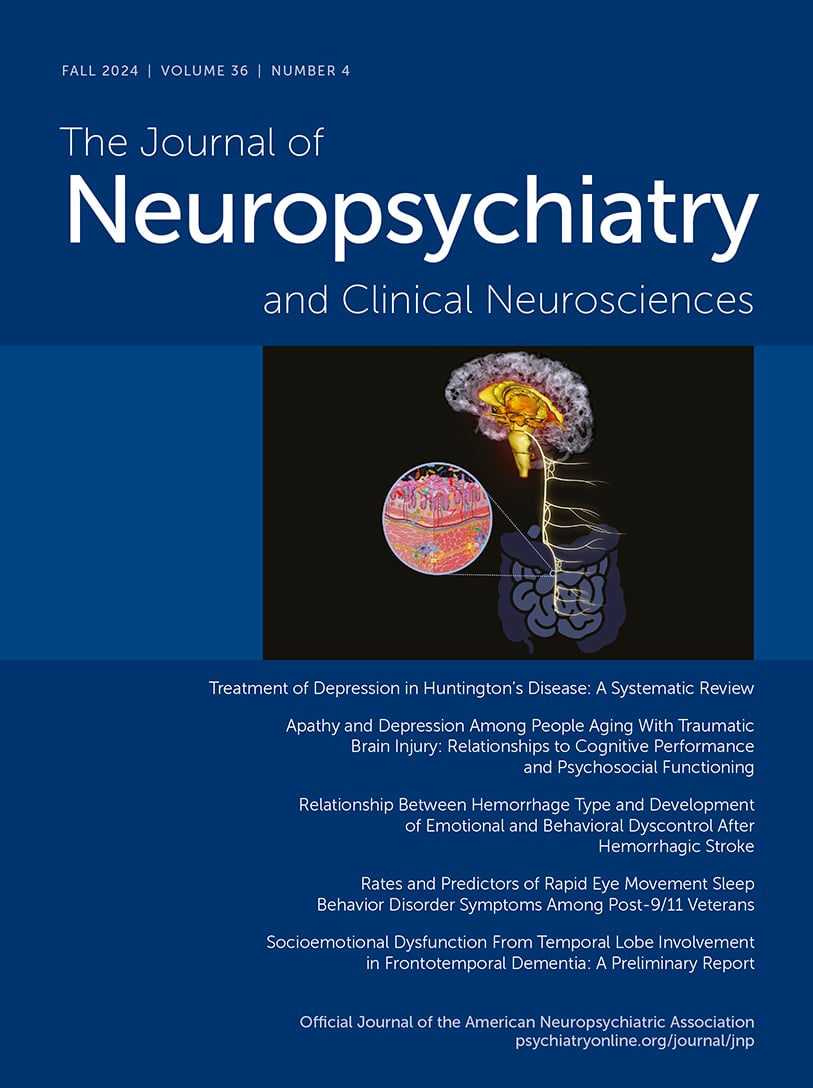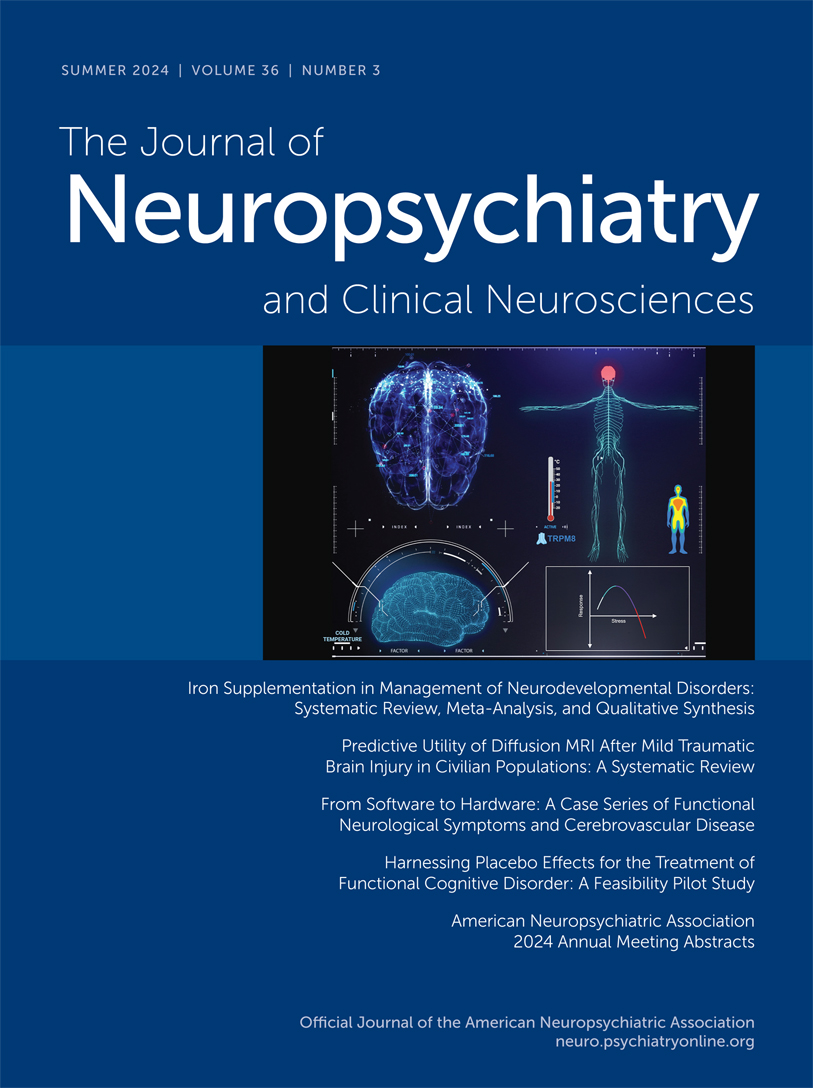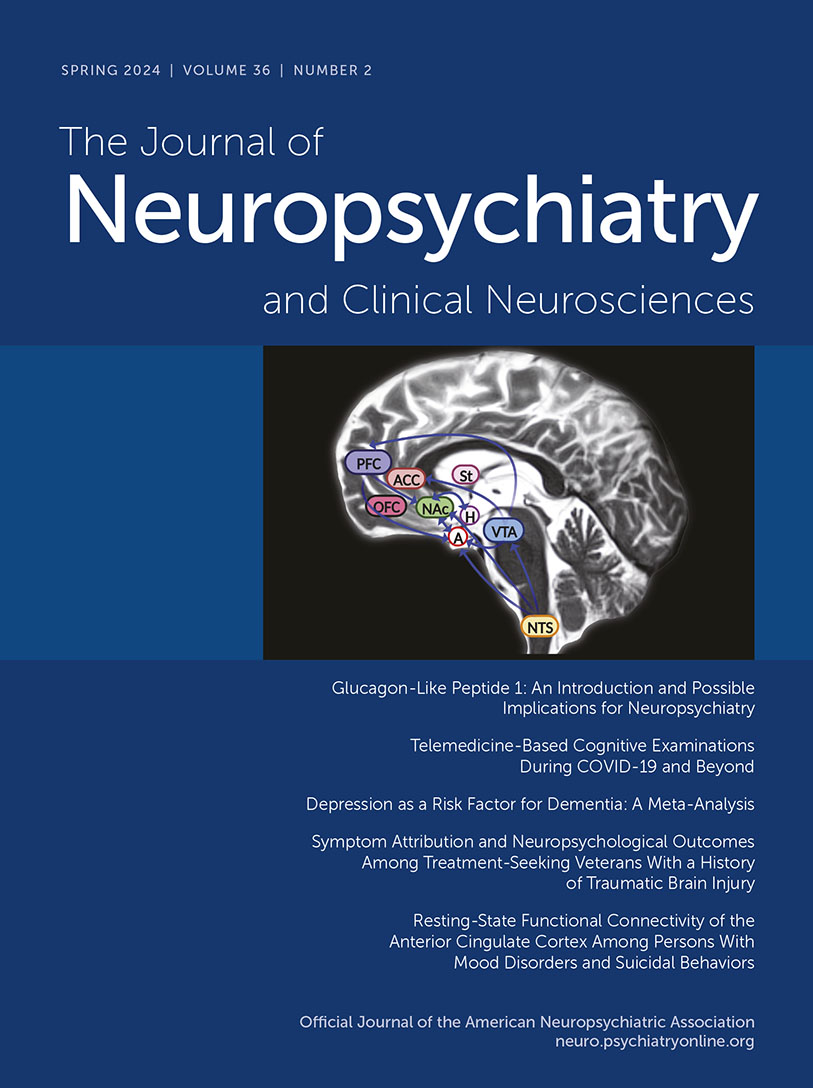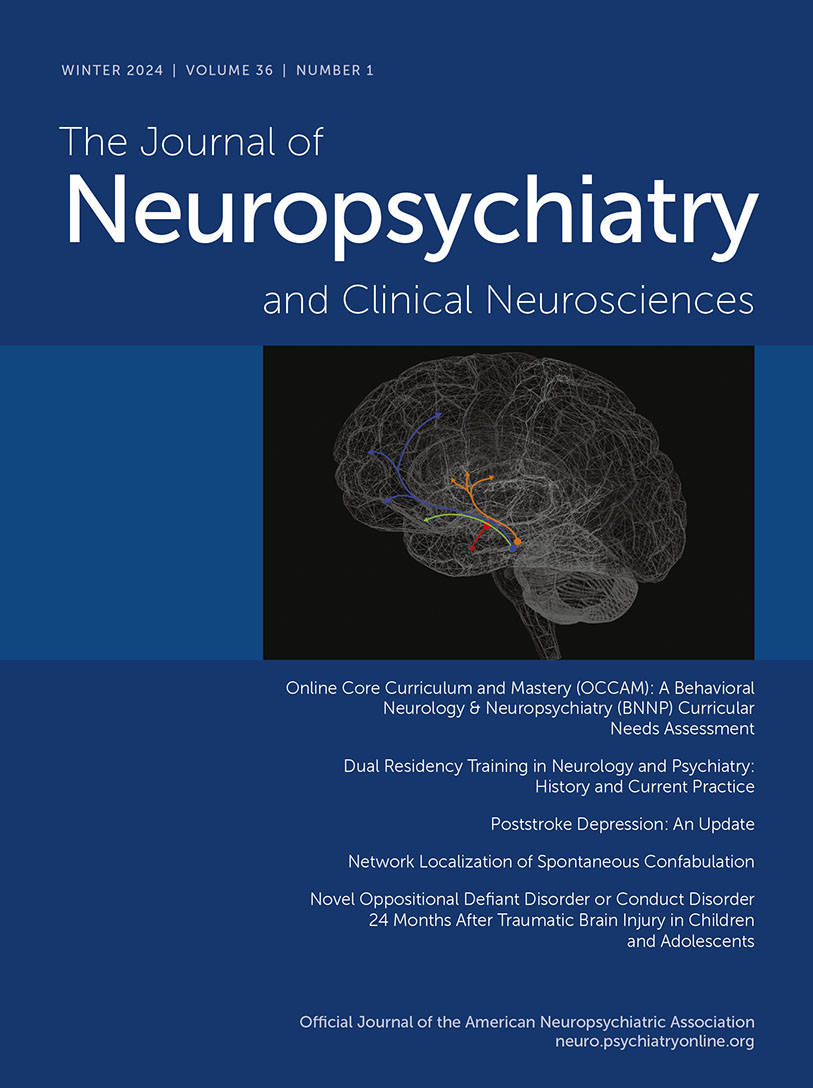The Journal of Neuropsychiatry and Clinical Neurosciences
- Volume 11
- Number 1
- February 1999
Editorial
Windows to the Brain
Special Article
Publication date: 01 February 1999
Pages8–18The author reviews the history, accomplishments, and goals of the American Neuropsychiatric Association on the occasion of the tenth anniversary of its founding.
https://doi.org/10.1176/jnp.11.1.8Publication date: 01 February 1999
Pages19–31Alzheimer's disease (AD), the most common cause of dementia, has become a major public health concern as our population ages. In recent years, AD has attracted the attention of a wide range of biological disciplines, and substantial progress has been made ...
https://doi.org/10.1176/jnp.11.1.19Regular Article
Publication date: 01 February 1999
Pages32–37Electroconvulsive therapy (ECT) is a safe and effective treatment for certain psychiatric disorders. Eleven patients who had sustained a closed head injury were treated with ECT for their psychiatric symptoms. Eight patients responded to an index course ...
https://doi.org/10.1176/jnp.11.1.32Publication date: 01 February 1999
Pages38–44This study examined the neurobehavioral effects of closed head injury (CHI) in older adults according to their significant others. Informants of 17 mild and moderate CHI patients ≥50 years old when injured completed the Geriatric Evaluation of Relative's ...
https://doi.org/10.1176/jnp.11.1.38Publication date: 01 February 1999
Pages45–50Proton magnetic resonance spectroscopy (MRS) was performed in a group of patients with multiple sclerosis (MS) and matched control subjects to examine the relationship between frontal lobe pathology and performance on tests of executive function. The N-...
https://doi.org/10.1176/jnp.11.1.45Publication date: 01 February 1999
Pages51–57The range of neuropsychiatric symptoms in multiple sclerosis (MS) has not been prospectively assessed. The authors, working at a tertiary medical center in Mexico City, used the Neuropsychiatric Inventory (NPI) to evaluate neuropsychiatric symptoms ...
https://doi.org/10.1176/jnp.11.1.51Publication date: 01 February 1999
Pages58–65Synesthesia is a perceptual condition in which stimulation in one sensory modality elicits a concurrent sensation in another. The authors studied possible electrophysiological correlates of synesthetic experience in 17 subjects claiming to continuously ...
https://doi.org/10.1176/jnp.11.1.58Publication date: 01 February 1999
Pages66–70The association between the apolipoprotein E epsilon 4 (APOE E4) allele and a wide spectrum of behavioral symptoms of Alzheimer's disease (AD) was investigated. Neither the severity nor the presence of any behavioral changes was associated with the number ...
https://doi.org/10.1176/jnp.11.1.66Publication date: 01 February 1999
Pages71–78Volumes of basal ganglia in postmortem brains of 8 patients with mood disorders and 8 control subjects without neuropsychiatric disorder were determined. Morphometry of serial whole-brain sections under the control of postmortem artifacts revealed reduced ...
https://doi.org/10.1176/jnp.11.1.71Publication date: 01 February 1999
Pages79–85The cholinesterase inhibitor tacrine (THA) and the M1 muscarinic agonist AF102B (cevimeline), both reported to enhance cognition in animals and humans, were tested in 5 macaques for reduction of spontaneous, random movements. Monkeys were videotaped 1 ...
https://doi.org/10.1176/jnp.11.1.79Publication date: 01 February 1999
Pages86–90Hyponatremia/hypoosmolemia causes marked morbidity and prolongs hospital stays in a significant subset of schizophrenic patients. Case reports with methodological limitations suggest clozapine ameliorates this water imbalance. To more conclusively assess ...
https://doi.org/10.1176/jnp.11.1.86Publication date: 01 February 1999
Pages91–96Neurological soft signs (NSS) have been shown to be more prevalent in chronically ill and in acute or never-medicated patients with schizophrenia. If neurological soft signs are trait-like, then NSS scores should be relatively stable over time and should ...
https://doi.org/10.1176/jnp.11.1.91Clinical and Research Report
Publication date: 01 February 1999
Pages97–99Lyme disease–induced hyperacusis can be an intensely disabling, chronic condition that is accompanied by posttraumatic stress disorder–like psychobehavioral sequelae. The authors describe effective treatment of 2 patients with carbamazepine. Speculations ...
https://doi.org/10.1176/jnp.11.1.97Publication date: 01 February 1999
Pages100–102Akinetic mutism is characterized by alertness with near complete absence of volitional activity. The authors report a case of episodically remitting akinetic mutism following subarachnoid hemorrhage.
https://doi.org/10.1176/jnp.11.1.100Publication date: 01 February 1999
Pages103–106The authors previously observed that schizophrenic patients generated fewer fixations of ≤50.1 ms in response to faces than did a clinical control group. This study examined whether deficits in short-duration eye movements were related to patients' ...
https://doi.org/10.1176/jnp.11.1.103Neuropsychiatric Practice and Opinion
Book Review
Letter
Abstracts
Calendar
Past Issues
View Issues Archive
Vol. 36 | No. 4

Vol. 36 | No. 3

Vol. 36 | No. 2
